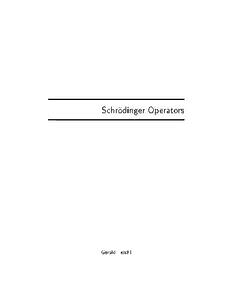
Schrodinger Operators PDF
Preview Schrodinger Operators
Schr¨odinger Operators Gerald Teschl Gerald Teschl Institut fu¨r Mathematik Nordbergstraße 15 Universit¨at Wien 1090 Wien, Austria E-mail address: [email protected] URL: http://www.mat.univie.ac.at/~gerald/ 1991 Mathematics subject classification. 81-01, 81Qxx Abstract. ThismanuscriptprovidesabriefintroductiontoSchr¨odingerop- erators. We start with the mathematical foundations of quantum mechanics and prove the spectral theorem. Then we consider quantum dynamics and establish Stone’s and the RAGE theorem. After a detailed study of the free Schr¨odinger operator we investigate self-adjointness of atomic Schr¨odinger operators and their essential spec- trum, in particular the HVZ theorem. Finally we have a look at scattering theory and prove asymptotic completeness in the short range case. Keywords and phrases. Schr¨odingeroperators, quantummechanics, spectral theory. Typeset by AMS-LATEX and Makeindex. Version: October 19, 2004 Copyright (cid:13)c 1999-2004 by Gerald Teschl Contents Preface vii Part 1. Mathematical Foundations of Quantum Mechanics Chapter 0. Preliminaries 3 §0.1. Borel measures 3 §0.2. Integration 5 §0.3. The decomposition of measures 7 §0.4. Banach spaces 8 §0.5. Lebesgue spaces 10 Chapter 1. Hilbert spaces 13 §1.1. Hilbert spaces 13 §1.2. Orthonormal bases 16 §1.3. The projection theorem and the Riesz lemma 19 §1.4. Orthogonal sums and tensor products 20 Chapter 2. Self-adjointness and spectrum 23 §2.1. Some quantum mechanics 23 §2.2. Self-adjoint operators 26 §2.3. Resolvents and spectra 36 §2.4. Orthogonal sums of operators 40 §2.5. Self-adjoint extensions 42 Chapter 3. The spectral theorem 45 iii iv Contents §3.1. The spectral theorem 45 §3.2. More on Borel measures 54 §3.3. Spectral types 56 §3.4. Appendix: The Herglotz theorem 58 Chapter 4. Applications of the spectral theorem 63 §4.1. Integral formulas 63 §4.2. Commuting operators 67 §4.3. The min-max theorem 69 §4.4. Estimating eigenspaces 71 §4.5. Tensor products of operators 72 Chapter 5. Quantum dynamics 75 §5.1. The time evolution and Stone’s theorem 75 §5.2. The RAGE theorem 78 Part 2. Schr¨odinger Operators Chapter 6. The free Schr¨odinger operator 85 §6.1. The Fourier transform 85 §6.2. The free Schr¨odinger operator 88 §6.3. The time evolution in the free case 90 §6.4. The resolvent and Green’s function 92 Chapter 7. Algebraic methods 95 §7.1. Position and momentum 95 §7.2. Angular momentum 96 §7.3. The harmonic oscillator 99 Chapter 8. Self-adjointness of Schr¨odinger operators 101 §8.1. Relatively bounded operators and the Kato-Rellich theorem 101 §8.2. More on compact operators 103 §8.3. Relatively compact operators and Weyl’s theorem 105 §8.4. One-particle Schr¨odinger operators 109 §8.5. Sturm-Liouville operators 110 Chapter 9. Atomic Schr¨odinger operators 119 §9.1. The hydrogen atom 119 §9.2. Angular momentum 121 §9.3. The spectrum of the hydrogen atom 124 Contents v §9.4. Atomic Schr¨odinger operators 127 Chapter 10. Scattering theory 135 §10.1. Abstract theory 135 §10.2. Incoming and outgoing states 138 §10.3. Schr¨odinger operators with short range potentials 140 Bibliography 145 Glossary of notations 147 Index 149 Index 151 Preface The present manuscript was written for my course Schr¨odinger Operators given at the University of Vienna in Winter 1999 and Summer 2002. It is supposed to give a brief but rather self contained introduction to the field of Schr¨odingeroperatorswithemphasisonapplicationsinquantummechanics. I assume some previous experience with Hilbert spaces and bounded linear operatorswhichshouldbecoveredinanybasiccourseonfunctionalanalysis. However,allnecessaryresultsarereviewedinthefirstchapter. Thematerial presented is highly selective and many important and interesting topics are not touched. It is available from http://www.mat.univie.ac.at/~gerald/ftp/book-schroe/ Acknowledgments I’d like to thank Volker Enß for making his lecture notes available to me and Maria Hoffmann-Ostenhof, Harald Rindler, and Karl Unterkofler for pointing out errors in previous versions. Gerald Teschl Vienna, Austria February, 2002 vii Part 1 Mathematical Foundations of Quantum Mechanics
